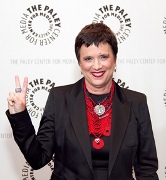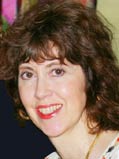 Photo: Wendy Moger-Bross
Photo: Wendy Moger-Bross
She came on the radar as the woman who gave a voice to a previously unmentionable—the vagina. Today it might seem ridiculous, but as Pat Mitchell, President of the Paley Center and the host for “An Evening with Eve Ensler” recalled, there was the time when she interviewed Ensler for CNN, and the word vagina could not be used. That night, it wasn’t an issue.
Back in the 90s, Ensler had decided to explore why the vagina was such a taboo subject. Wondering how many women had lived their whole lives without having an orgasm, she reached out with the call, “If you want to discuss your vagina—contact me.” Moving into uncharted territory nobody else was talking about, she interviewed over 200 women. Ensler learned that the majority of those who wanted to speak to her had a story about physical invasion—rape and incest—that they needed to share. “It was,” she said, “epidemic.”
In 1996, Ensler began to perform the Vagina Monologues as a one-woman show. It became a pioneering success. HBO came calling. They wanted to film her performance, which expanded the reach of the material way beyond the original theatre venue.
The Vagina Monologues, which has been performed around the world in over 140 countries and has been translated into more than 45 languages, laid the groundwork for V-Day, an international action to end the violence against women and girls. V-Day has raised more than $80 million through benefit productions of The Vagina Monologues. It has helped women from the Yankton Sioux Reservation in the United States to the Democratic Republic of Congo, where Ensler’s City of Joy had its opening in February 2011.
The revelations of the play tied in with Ensler’s own personal journey, which began in Scarsdale, N.Y. She spoke to the Paley audience about “things that happened in invisible places. It was all about power, and how my body was used,” she said. To survive it, she began writing, and at an early age created another persona who had a perspective that kept her sane. She was passionate about “other wrongs,” like nuclear disarmament and homelessness. Her first attempt at social organizing was to get all the “unpopular girls” together.
Although Ensler spoke of herself as a “consequence of violence,” she added, “I don’t feel that way as much anymore since the cancer.”
In 2010, Ensler was diagnosed with uterine cancer. She found out about it on her way to Haiti, where she was traveling to work with women whose lives had been devastated by the earthquake. She had surgery, a tough month of repeated infections, and then a regimen of chemotherapy. Yet she always felt surrounded by the strength of her relationships. She said, “I would have been embarrassed if I hadn’t gotten better.”
Ensler talked about the hard, difficult pain of cancer. Yet for her, it was also a transformative experience. Both at the Paley Center and the TEDwomen conference—where Ensler closed the event—she was direct about how her disconnect from her body was directly attributable to the violence in her background. She drew parallels between her body and the earth, seeing the “cancer that is everywhere from the carelessness.”
Speaking at the Paley Center, Ensler reflected, “There’s no security. We should just surrender to the mad insecurity. My body became a way of becoming connected. Our bodies can be the teacher and lead us. We block ourselves from seeing what we don’t want it to see. The body is the pathway. How far are we willing to go—each of us—to save the species?”
It’s not surprising that Ensler, who has been so focused on the issue that one out of every three women, globally, will be physically or sexually abused in her lifetime, saw her illness in a larger context. On October 26, 2010, Ensler read her narrative poem, “The Gift of Cancer” to an audience at the Women’s Conference in Long Beach, California. It captures her experience completely. It begins:
It happens like this
The doctor walks towards me
His face is ashen
He says we have found something
It does not look good
There is a trap door in the seat of the waiting room
And I am falling
And as I fall I hear
The echo of him saying
Cat scan
As big as a mango
We can't be sure
This falling goes on for days
Even though I appear to be walking
And giving speeches and riding on airplanes
I am falling
As the new doctor at the new hospital
says it
says CANCER
As I wait to hear where it's coming from
And where it's gone
As I get pricked and probed and punctured
I am falling
As they first say it is not in my liver
And then later they can't be sure
Falling
Until they drug me and wheel me off
For nine hours
And when I wake up
I am in a new country
Nothing is familiar
Because the possibility of not dying
Is gone
Because I am now living in the land of the sick
Turns out my being a vegetarian-sober-nonsmoker-activist has not protected me at all
The surgeon tells me he has done 1,000 operations and he has never seen anything like it
Then he uses the word fistula
And uterus
First thing I think of course is
Congo
I knew from the first time I went to Panzi hospital in Bukavu
I stood in the place that felt like an open barn
In the place where 200 women sat on benches
Their wounded heads
Their canes
Their sweat
The strong smell of pee and shit from their fistulae
From the holes their rapist pierced into their bodies, tearing them apart
I knew from that first moment
When I looked into their faces
And saw the crimes of this century burning in their eyes
500,000 raped women
500,000 vaginas violated
500,000 bodies massacred
500,000 wombs destroyed
I had no way to protect myself
From the hugeness of the atrocity
From the insanity of this disgrace
It rolled over me like a tsunami of pain and took me
Took me took me
I have never come back
And I never will
And I knew those women now owned me
Have me
There is no other place I could ever be
No other fight that is not this fight
It's in your uterus
The tumor of rape
That is wild across the world
The tumor of rape
Ensler continues the analogy between her first experience of violation at the age of five to an ongoing struggle to prove her self-worth. She describes how cancer forced her to slow down her pace and examine everything in a new light. For her, being ill was a way of divesting herself of extraneous thoughts and demands, liberating her. She came to understand that time is short, for healing the world and coming to grips with how we can all play a role in that.
Watch her speak the words, from the complete presentation. You cannot help but be inspired and moved.
Ensler is currently cancer-free.
Photo: Wendy Moger-Bross





Add a CommentComments
There are no comments yet. Be the first one and get the conversation started!